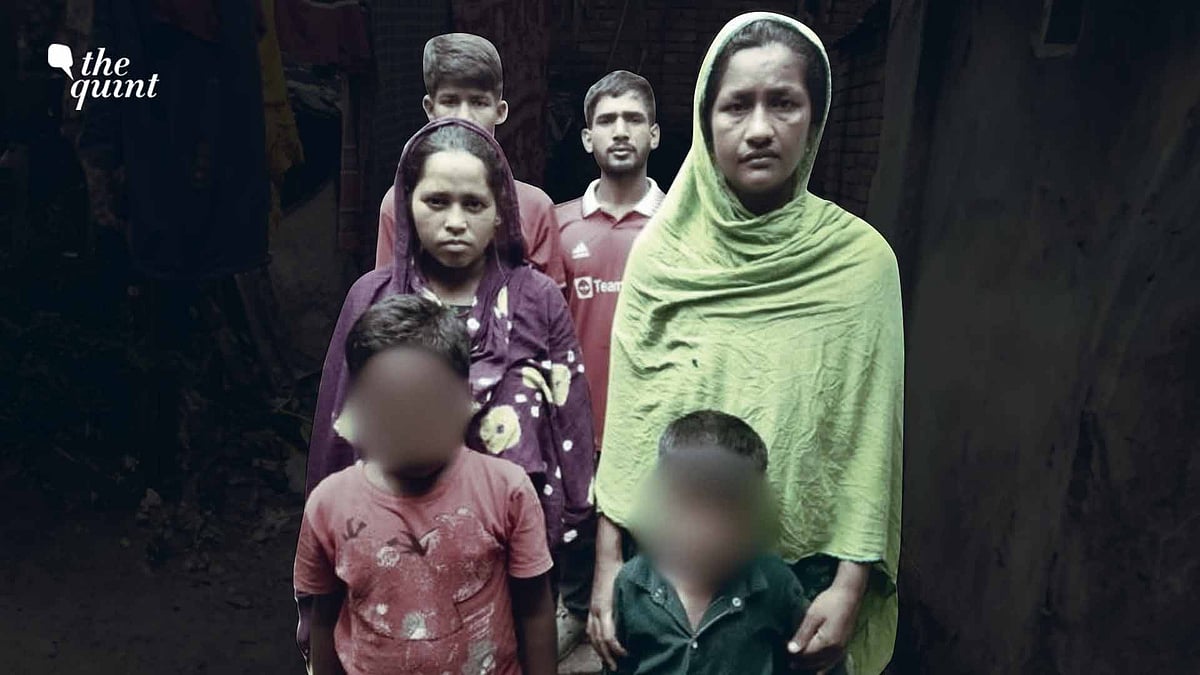
'Send to India': Bangladesh Court on Deported Pregnant Bengali Woman, 5 Others
Six members of two migrant families were deported to Bangladesh. One is a pregnant woman now in her final trimester.

advertisement
"We have some hopes now. Maybe, now they might return in another month."
These are the words of Amir Khan, younger brother of Sweety Bibi, as told to The Quint on Friday, 10 October. Sweety, and five others, including a pregnant Sonali Khatun, from two separate migrant families, were deported to Bangladesh four months back on suspicion of being "illegal Banlgadeshis."
Earlier, on 26 September, the Calcutta High Court had set side the Centre's decision to deport Sonali, Sweety, and others, and directed that they be repatriated within four weeks.
A division bench of Justice Tapabrata Chakraborty and Justice Reetobroto Kumar Mitra held that the deportation was "illegal," and rejected the Centre's plea seeking to defer the order.
Their deportation came on the heels of detentions of Bengali migrant labourers in Gujarat, Maharashtra, Delhi and Madhya Pradesh during the drive to nab 'illegal Bangladeshis' some months ago. The Quint had reported on this story.
Amir confirmed to The Quint that there are a total of six people who were deported to Bangladesh — Sonali, her husband Danish Ali, their minor son, Sweety, and her two sons.
Sonali, 33, is in her final trimester of pregnancy. This has gripped her family with anxiety as they await her return lest she delivers her baby in jail or an unknown land in Bangladesh, giving rise to a complicated citizenship crisis.
Before she was deported, Sweety worked as a scrap collector in Delhi.
Both women and their families belong to the Birbhum district in West Bengal. As per news reports, the migrants were picked up from around Delhi's Rohini.
The court order notice as accessed by The Quint shows that the court cited the deportees' Aadhaar card numbers and residential addresses as proof.
"It is necessary to inform the Indian High Commission in Bangladesh for the purpose of taking steps to push back the accused to India as per the law," read the notice.
The court order notice from a Bangladesh court on the migrants who were wrongfully deproted.
(Photo: Accessed by The Quint)
The court’s order has been officially sent to the Indian High Commission in Dhaka, as confirmed by Safirul Islam, an MP from the Trinamool Congress (TMC) and chairman of Migrant Workers Welfare Board in West Bengal.
"Samirul Islam and Mamata Banerjee are helping us, and the local administration has also been helpful," stated Amir.
Islam wrote about the court order on X, noting, "This exposes yet again how the anti-Bengal BJP cruelly targets poor Bengali-speaking people, labelling them as Bangladeshis and deporting them for no other reason than their language. We still remember how a few of the BJP’s agents in Bengal tried to portray them as Rohingyas. Those attacks didn’t spare even me or my family."
TMC's Safirul Islam has been helping Sweety Bibi and Sonali Khatun's family.
Arnab Pal, chief advisor to the Migrant Workers Unity Forum stated that Sonali is not getting proper medical care at this stage of pregnancy and pointed out why the chronology of trying to repatriate them should have been different.
"We should have focused on getting them back first as now they are entangled in a legal battle. Now that the Bangladesh Court has ordered, it is up to Indian government what action they will take. It seems like they are dragging their feet on this matter," Pal told The Quint.
Sweety and Sonali's case represents many other such cases that took place between May and July this year, in which Bengali migrants, mostly Muslims, who were suspected to be "undocumented foreigners" or "illegal immigrants" were picked up and pushed into Bangladesh.
TMC MP Abhishek Banerjee, referring to Calcutta HC's order, had stated few weeks ago: "The High Court gave an order stating that the FRR (Foreigners Regional Registration) deportation is completely illegal, stating this in open court. Furthermore, it has stated that they must be brought back to India within four weeks. If they see Bengal (or Bengali things), they call it Bangladesh; if someone speaks Bengali, they say they must be arrested."
The anxieties of families like Sweety and Sonali have only amplified with time given the unending wait, uncertainty, and targeted attacks against Bengali speaking-Muslims migrants.
Bhodu Sheikh, Sonali's father, had told The Wire, “I pray that my grandchild is born in my country. “We are anxious about new problems over citizenship.”
The Supreme Court had also heard pleas concerning the detention and deportation of these migrants, including Sonali. Arguing in front of Bench of Justices Surya Kant, Joymalya Bagchi, and Vipul M Pancholi, advocate Prashant Bhushan had observed:
- Access to all paywalled content on site
- Ad-free experience across The Quint
- Early previews of our Special Projects
Published: undefined